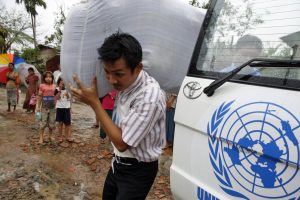Eight months after the military’s disastrous seizure of power in Myanmar, a total of 20 million people – nearly half the population – are now living in poverty, the U.N.’s top humanitarian official in the country said yesterday.
Andrew Kirkwood, the acting U.N. humanitarian coordinator in Myanmar, said in a virtual briefing that the country’s people faced “a severe crisis.” He added that the number of people needing basic humanitarian aid has tripled to 3 million since the February coup, a level of poverty not seen for at least 20 years.
“We are saving lives. We are making a difference,” Kirkwood said in the briefing. “But we’re also quite frustrated that these numbers aren’t higher and that we aren’t able to reach all of the 3 million people who we know need urgent humanitarian assistance.”
Since the coup, U.N. officials have issued progressively greater concerns about the situation in Myanmar, where the military’s seizure of power in February has pushed the country toward nationwide civil war and economic collapse. But as the ranking U.N. official on the ground inside Myanmar, with responsibility for coordinating the humanitarian response, Kirkwood’s words carry special weight.
Kirkwood, cited a number of “significant operational challenges” including travel and COVID-19 pandemic restrictions, as well as the increasingly unstable political climate. He called on all parties “to use their influence to facilitate the safe and unhindered access for humanitarian workers and also our humanitarian supplies.”
Significantly, he also pointed to the challenges of attempting to deliver aid in such a politically polarized environment. Recent months have seen the anti-coup resistance turn from peaceful protests and work stoppages to increasingly violent tactics to unseat the military junta led by Sen. Gen. Min Aung Hlaing. These efforts were given a boost last month, when the opposition National Unity Government (NUG) declared a “people’s defensive war” against what it referred to as the “terrorist junta.”
Beginning with hit-and-run attacks with rudimentary weapons, rebel forces known as people’s defense forces (PDFs) are now inflicting increasingly deadly attacks on junta soldiers and officials. This has prompted fierce and disproportionate reprisals from the military that brought conflict to regions of the country – like Chin State and Sagaing, Mandalay, and Magwe regions – that used to be relatively peaceful.
This turn to armed struggle has come about at least in part due to the perceived lack of action on the part of foreign governments, especially those that have voiced rhetorical support for the democratic resistance. In an interview this week, Naing Htoo Aung, permanent secretary at the NUG Ministry of Defense, told Radio Free Asia that “the NUG had no other alternative but to start a war in self-defense, instead of waiting for the international community to act.” In a context in which neither side is willing to compromise with the other, any foreign engagement with the military junta has become effectively anathematized.
“Emotions are running very high here,” Kirkwood said. “Many people are frustrated, and some people frankly confuse the delivery of humanitarian assistance with taking sides in the conflict.”
According to Kirkwood, the 2 million new people in need of aid are in areas like Chin State, “where we’ve seen tens of thousands of people displaced over the last couple of days. Entire villages have been displaced, people living in forest, with very, very little.”
While the U.N.’s food and cash assistance programs have aided more than 1.4 million people, he said that the U.N. is running short of funds to extend its aid to the newly needy. “We have a funding gap of roughly $250 million. And that means in turn that we won’t be able to reach everybody who needs our assistance,” he said.
Kirkwood’s assessment is a sobering reminder of the scale and complexity of the crisis now afflicting Myanmar and its people. As the longtime Myanmar watcher Bertil Lintner wrote recently, “It is becoming increasingly evident that Min Aung Hlaing and his military allies opened a Pandora’s box of disasters when their tanks rolled into Naypyitaw and Yangon on February 1.”
It also suggests that in the absence of any will on either side to push forward a political resolution, the role of the U.N. and other aid agencies will remain essentially palliative.

































